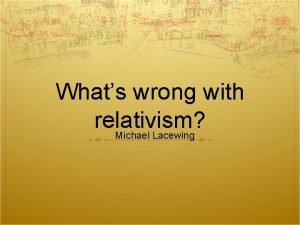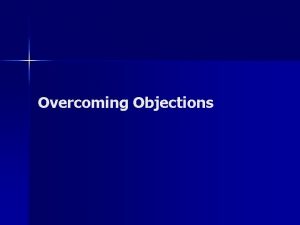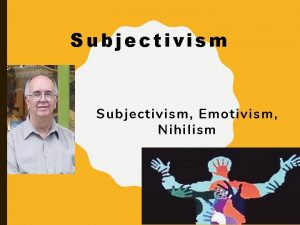Emotivism Michael Lacewing enquiriesalevelphilosophy co uk c Michael











- Slides: 11

Emotivism Michael Lacewing enquiries@alevelphilosophy. co. uk (c) Michael Lacewing

Cognitivism v. non-cognitivism • What are we doing when we make moral judgments? • Cognitivism: moral judgments, e. g. ‘Murder is wrong’ – Aim to describe how the world is – Can be true or false – Express beliefs that the claim is true • Non-cognitivism: moral judgments – Do not aim to describe the world – Cannot be true or false – Express attitudes towards the world (c) Michael Lacewing

Subjectivism • Moral judgements assert or report approval or disapproval – E. g. ‘X is wrong’ means ‘Most people disapprove of X’ – This is a cognitivist theory • Obj: racism is wrong, even though, historically, most people have approved of it (c) Michael Lacewing

Speaker subjectivism • ‘X is wrong’ means ‘I disapprove of X’ – Again, cognitivism: it is a psychological fact that I disapprove of X • Obj: (if we know what we think) we cannot make moral mistakes – Why deliberate? • Emotivism: Moral judgments cannot be true or false – ‘X is wrong’ expresses disapproval of X (c) Michael Lacewing

Ayer’s emotivism • The verification principle: a statement only has meaning if it is either analytic or empirically verifiable • Moral judgments are not analytic and cannot be shown to be true or false by empirical verification • Therefore, they are literally meaningless, stating neither truth nor falsehood (c) Michael Lacewing

Ayer’s emotivism • ‘If I say to someone, “You acted wrongly in stealing that money”…I am simply evincing my moral disapproval of it. It is as if I had said, “You stole that money, ” in a peculiar tone of horror’. • Moral language expresses our feelings and arouses feelings in others to influence their action (c) Michael Lacewing

Stevenson • Descriptive and emotive meaning – Central terms (good, bad, right, wrong) are only emotive – Others, e. g. ‘lie’, ‘respect’, have both meanings • Emotive meaning is connected to use: the purpose is not to state facts, but to influence other people’s behaviour (c) Michael Lacewing

Emotivism • This explains why moral judgments motivate us – If moral judgments just described the world, how would they get us to act? – We have to care – Moral judgments express our attitudes, what we care about (c) Michael Lacewing

Objections • Much emotive language is not about morality, e. g. advertising – What makes emotive language moral? • Moral language doesn’t always function to influence others • Moral language isn’t always emotive • Reply: The purpose of ethical language is to influence others, and this provides its core meaning – But this is compatible with some non-influential uses and some non-emotive uses (c) Michael Lacewing

Moral argument • If moral judgments are just expressions of attitude, then the attempt to influence others is not rational – Any moral ‘argument’ that influences someone will be a ‘good’ argument • Ayer: moral argument is only ever argument over facts – There can be no argument over values (c) Michael Lacewing

Moral argument • But if we disagree about a moral judgment, but moral judgments are neither true nor false, is this even a ‘disagreement’? • And if emotivism is right, there is no rational process of deciding which attitudes to keep – What reason do we have to change our minds? (c) Michael Lacewing





















